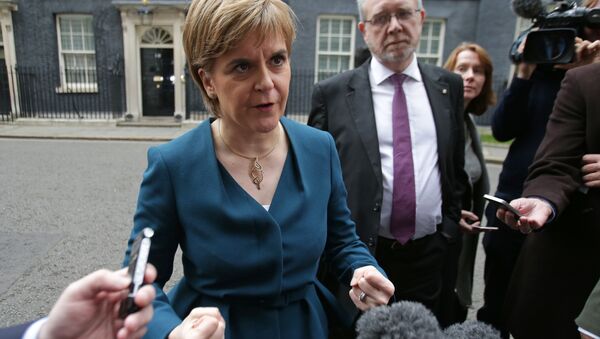In the Prime Minister's first interview with UK media in 2017, May said she was not interested in keeping "bits" of EU membership, and that regaining control of immigration policy would be a priority, an aim incompatible with EU membership.
She spoke a mere hour after Nicola Sturgeon restated her commitment to holding a second independence referendum in the event of the UK leaving the single markets, stating she would not tolerate Scotland being "driven off a hard Brexit cliff edge."
May also used the interview to counter claims from Sir Ivan Rogers, who resigned as UK ambassador to the EU on January 3, that the government's thinking on Brexit was chaotic and disordered.
Confirmed: UK's EU ambassador Sir Ivan Rogers quits. He had warned Brexit trade deal could take as long as 10 years.
— Nick Eardley (@nickeardleybbc) January 3, 2017
"Our thinking on this isn't muddled at all," May said.
"Often people talk in terms of the UK leaving the EU, but still keeping bits of membership. We are leaving. We are coming out. We are not going to be a member of the EU any longer. We will be able to have control of our borders, control of our laws."
EU leaders have repeatedly made clear that if Britain refuses to accept the pillar of freedom of movement, it will no longer enjoy single market membership and the tariff-free trade that entails. May believes EU countries would still be willing to allow the UK tariff-free single market access, as it would be in their interests.
Moreover, support for a "hard Brexit" is gaining among the UK business sector.
A report by think tank Civitas, suggested the UK could very easily mitigate the impact of heightened tariffs and could in fact benefit from having no trade deal with EU. In all, the report suggests the UK government could raise billions from placing tariffs on imports, with receipts funding an industrial strategy that would boost UK manufacturing.
Mitigating the impact of post-Brexit tariffs on UK-EU trade. Our new paper published today: https://t.co/xAwNj6p0tx
— Civitas think tank (@Civitas_UK) January 9, 2017
A spokesperson for the think tank suggests an exit from the single market would remove "damaging" restrictions such as the carbon price floor, which is "hurting" British competitiveness and low-income households.
"We can also provide greater research and development tax incentives, and increase regional aid, which is limited by EU rules at present. The real question is not "how soft a Brexit can we achieve?" but rather "how hard a negotiation do we wish to drive with the EU?" The balance of negotiating strengths is favorable to the UK. If the EU wishes to impose tariffs on British exports, Britain has little to fear," a spokesperson for Civitas told Sputnik.
In December 2016, the SNP published a list of demands for Brexit negotiations, which included a pledge to hold a second independence referendum if they aren't met. In the June 23 referendum, 62 percent of Scottish electors voted to remain, a 24-point margin, with every single local authority area returning a remain vote — a far higher number than voted to remain part of the UK in 2014.
"The ball is now in their court." @NicolaSturgeon writes ahead of @scotgov #Brexit plan publication on Tuesday. https://t.co/9vEd1PwNFV pic.twitter.com/U48ByUBEA2
— The SNP (@theSNP) December 18, 2016
The fulfilment of these demands requires the repatriation of powers from the EU to Scotland and the SNP is said to be wary of Westminster making a "power grab" in Brexit negotiations.
However, the proposals were slammed as "unworkable" and "ill-thought out" by Anders Vistisen, a Danish People's Party MEP, who believed they would be reflexively blocked by member states such as Spain, in order to suppress the independence aspirations of their own separatist movements.




